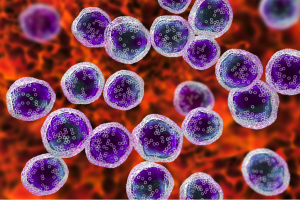What is Cancer in TCM?
 Cancer, or malignancy, entails the uncontrolled growth and spread of abnormal cells, posing serious health risks as they infiltrate and damage surrounding tissues and organs.
Cancer, or malignancy, entails the uncontrolled growth and spread of abnormal cells, posing serious health risks as they infiltrate and damage surrounding tissues and organs.
In Traditional Chinese Medicine (TCM), cancer reflects underlying imbalances in Qi, Blood, and organ systems, influenced by factors like emotional stress, diet, environment, and genetics.
As complementary therapies, acupuncture and TCM herbs aid conventional cancer treatments, easing symptoms, enhancing quality of life, and bolstering the body’s healing mechanisms.
Acupuncture can manage cancer-related symptoms such as pain, nausea, fatigue, insomnia, anxiety, and depression by targeting specific acupoints, fostering relaxation, and restoring energy balance.
TCM herbs can strengthen the immune system, aiding the body’s defense against cancer cells and mitigating treatment side effects.
These therapies can alleviate chemotherapy-induced nausea and vomiting, radiation-induced skin reactions, and chemotherapy-induced peripheral neuropathy, enhancing overall well-being and treatment tolerance.
Moreover, acupuncture and TCM herbs provide crucial emotional support, alleviating stress, anxiety, and depression, and fostering resilience during treatment challenges.
Causes of Cancer
 In TCM, cancer is perceived as a disruption of the body’s harmonious balance of Qi, Blood, Yin, and Yang energies, rather than a standalone disease. Various factors contribute to these imbalances, leading to the development of cancerous conditions:
In TCM, cancer is perceived as a disruption of the body’s harmonious balance of Qi, Blood, Yin, and Yang energies, rather than a standalone disease. Various factors contribute to these imbalances, leading to the development of cancerous conditions:
- Qi Stagnation: Emotional stress, particularly unresolved emotions such as anger and frustration, can disrupt the smooth flow of Qi in the body, leading to stagnation and blockages along the meridians. Acupuncture helps regulate Qi flow by stimulating specific acupoints, while TCM herbs with properties to soothe the Liver and promote Qi circulation may also be used to address Qi stagnation. Cancer patients diagnosed with Qi deficiency or CRF have poor quality of life.[1]
- Blood Stasis: Trauma, injury, or chronic inflammation can lead to the accumulation of stagnant or congealed Blood, obstructing Qi flow and predisposing to various health issues, including cancer. Acupuncture activates specific acupoints to promote Blood circulation and resolve stasis, while herbs are utilized for their blood-moving properties. Studies have shown that the hypercoagulable state, or blood stasis, in patients with tumors, is closely related to the formation of a tumor immunosuppressive microenvironment. Once blood stasis occurs, it can inhibit the body’s antitumor immune function in multiple steps and promote the occurrence and development of tumors.[2]
- Phlegm-Dampness: An accumulation of dampness and mucus in the body, often due to poor diet and weak Spleen function, can impair organ function and contribute to the formation of masses or tumors. Acupuncture facilitates fluid movement and clears dampness, while herbs help resolve phlegm dampness by drying and resolving properties.
- Heat-Toxin: Environmental toxins, emotional stress, and dietary factors can lead to the accumulation of pathogenic heat in the body, promoting inflammation, tissue damage, and the formation of tumors. Acupuncture aids in detoxification and promotes the elimination of toxins, while herbs possess detoxifying and heat-clearing properties to address heat toxins.
- Deficiency of Yin or Yang: Imbalances in Yin and Yang energies weaken the body’s defenses, making it more susceptible to diseases, including cancer. TCM herbs can nourish Yin and tonify Yang, restoring balance to the body’s energy systems. Yin and Yang can gradually deplete with aging, which is accompanied by TCM syndrome changes from excess to deficiency. A study has reported that most patients with stage I–III or stage IV lung cancer had lung-spleen Qi deficiency or Qi and Yin deficiency syndrome, respectively.[3]
What self-care Method Can Help Cancer?
Self-care methods are invaluable tools that can enhance the well-being of individuals undergoing cancer treatment. Here’s a breakdown of some self-care strategies:
 Mindfulness and Stress Reduction: Incorporating mindfulness practices like meditation, deep breathing exercises, and guided imagery into your daily routine can help alleviate stress and promote emotional well-being. By calming the mind and body, these techniques complement the healing process facilitated by acupuncture and TCM herbs.
Mindfulness and Stress Reduction: Incorporating mindfulness practices like meditation, deep breathing exercises, and guided imagery into your daily routine can help alleviate stress and promote emotional well-being. By calming the mind and body, these techniques complement the healing process facilitated by acupuncture and TCM herbs.
 Nutrition and Diet: A balanced diet with fruits, vegetables, whole grains, and lean proteins supports health and immunity during cancer treatment. Avoid processed foods, sugary snacks, and excess alcohol for energy and to manage side effects. Consult with a specialized dietitian for personalized dietary guidance aligned with treatment goals.
Nutrition and Diet: A balanced diet with fruits, vegetables, whole grains, and lean proteins supports health and immunity during cancer treatment. Avoid processed foods, sugary snacks, and excess alcohol for energy and to manage side effects. Consult with a specialized dietitian for personalized dietary guidance aligned with treatment goals.
 Gentle Exercise: Engaging in gentle forms of exercise such as walking, yoga, tai chi, or qigong promotes circulation, reduces fatigue, and enhances overall well-being. Consultation with a healthcare provider prior to initiating a new exercise regimen ensures safety, especially for individuals with specific health concerns or physical limitations. The expert group of WHO concluded that limiting weight gain during adult life, thereby avoiding overweight and obesity reduces the risk of postmenopausal breast cancer, colon cancer, endometrial cancer, kidney (renal cell), esophagus (adenocarcinoma) and thyroid cancer.[4]
Gentle Exercise: Engaging in gentle forms of exercise such as walking, yoga, tai chi, or qigong promotes circulation, reduces fatigue, and enhances overall well-being. Consultation with a healthcare provider prior to initiating a new exercise regimen ensures safety, especially for individuals with specific health concerns or physical limitations. The expert group of WHO concluded that limiting weight gain during adult life, thereby avoiding overweight and obesity reduces the risk of postmenopausal breast cancer, colon cancer, endometrial cancer, kidney (renal cell), esophagus (adenocarcinoma) and thyroid cancer.[4]
 Rest and Sleep: Prioritizing adequate rest and sleep is essential for supporting the body’s healing process and replenishing energy levels. Establishing a relaxing bedtime routine, creating a comfortable sleep environment, and avoiding stimulants like caffeine and electronic devices before bedtime facilitate restful sleep. Incorporating relaxation techniques such as meditation or gentle stretching aids in unwinding and promoting sleep quality. The study supports that self-efficacy beliefs and self-care both significantly and positively influence the quality of life of patients with breast cancer.[5]
Rest and Sleep: Prioritizing adequate rest and sleep is essential for supporting the body’s healing process and replenishing energy levels. Establishing a relaxing bedtime routine, creating a comfortable sleep environment, and avoiding stimulants like caffeine and electronic devices before bedtime facilitate restful sleep. Incorporating relaxation techniques such as meditation or gentle stretching aids in unwinding and promoting sleep quality. The study supports that self-efficacy beliefs and self-care both significantly and positively influence the quality of life of patients with breast cancer.[5]
 Emotional Support: Seeking emotional support from friends, family members, support groups, or mental health professionals can provide invaluable assistance in navigating the emotional challenges associated with cancer diagnosis and treatment. Expressing feelings, engaging with individuals who share similar experiences, and seeking professional counseling offer avenues for coping and fostering resilience during challenging times.
Emotional Support: Seeking emotional support from friends, family members, support groups, or mental health professionals can provide invaluable assistance in navigating the emotional challenges associated with cancer diagnosis and treatment. Expressing feelings, engaging with individuals who share similar experiences, and seeking professional counseling offer avenues for coping and fostering resilience during challenging times.
 Complementary Therapies: Exploring complementary therapies like massage therapy, acupuncture, or TCM herbs alongside conventional cancer treatments can alleviate symptoms such as pain, nausea, fatigue, and anxiety. The findings reveal some effective complementary therapies such as auriculotherapy, acupuncture, moxibustion, hypnosis, muscle relaxation, guided imagery, yoga, music therapy, and traditional Chinese medicine.[6]
Complementary Therapies: Exploring complementary therapies like massage therapy, acupuncture, or TCM herbs alongside conventional cancer treatments can alleviate symptoms such as pain, nausea, fatigue, and anxiety. The findings reveal some effective complementary therapies such as auriculotherapy, acupuncture, moxibustion, hypnosis, muscle relaxation, guided imagery, yoga, music therapy, and traditional Chinese medicine.[6]
How Can We Help?
At Happipuncture, we offer integrative services to complement conventional cancer treatments. Here’s how we support individuals facing cancer:
Symptom Management: Alleviates cancer-related symptoms like pain, nausea, and fatigue, improving overall well-being.
Immune Support: Strengthen the immune system, enhancing resilience during cancer treatment.
Side Effect Reduction: Mitigate side effects of treatments like chemotherapy and radiation therapy, promoting tolerance and comfort.
Emotional Support: We provide compassionate care to alleviate stress, anxiety, and depression, restoring inner harmony.
Quality of Life Improvement: By addressing physical symptoms and enhancing emotional well-being, we aim to optimize treatment outcomes and promote vitality.
At Happipuncture, our integrative approach empowers individuals to actively participate in their healing journey. Contact us at to learn how we can support you during cancer treatment and beyond.




